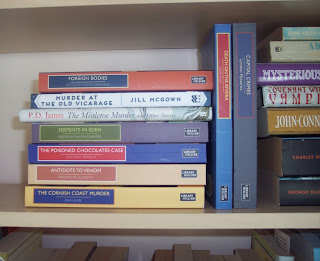I look at my tbr pile somedays and wonder if I'll ever live long enough to read them all. There're easily several hundred books, probably more, scattered round the house and sitting amongst those read books that I don't want to part with. In my study I tend to keep those I plan to read soon and quite frankly there's plenty of those to be going on with. I stand and look at my bookshelves. Books jump out at me, so I make a pile I plan to read soon. A week later I change that pile, put one or two back, replace them with other 'must read soon' treasures.
Am I alone in doing this? I wondered. It might seem a bit eccentric to non-readers or, to be more precise, non-lovers of books. Plenty of people exist who love to read but don't worship in the Cult of Loving Books. My husband would be one of these. He feels no need to own books, doesn't stand contentedly in front of a shelf of beautiful books with a soppy grin on his face. Doesn't pick one up and stroke the cover thinking, 'My precious...'
I took some photos of books that I want to read soon. (He doesn't do that either...) The books that will be read over the next few months. Even just 'this year' would be good. (That may or may not happen...) So here they are:
On this little pile we have two non-fictions about France (both about canal boating), a book of sci-fi stories from The British Library, a book of short stories about WW2, also from the British Library and two Patrick Leigh Fermor books. I want to read the biography about him but feel I should read the second book of his European wanderings before WW2, first.
These are a few of my 2018 challenge books. I'm doing The European Reading Challenge and the What's In a Name? one. Germany, Turkey, Greece and Denmark are covered in the lefthand pile, Swiss Vendetta can't make up its mind which pile it should be in as it's set in Switzerland but could also cover the category 'A nationality' in the What's in a Name? challenge, because of its title. I'm not sure I need this kind of stress...
One of my big problems is being interested in everything, thus books here about Britain and its countryside, the weather (how much more British could you get?), gardening, anthropology, travel, rivers, even Canadian Naturalists... I'm a lost cause really.
This lot are self-explanatory, from the covers it's obvious they're mainly British Library Crime Classic books, I love them, and yes, this is partly to do with how gorgeous the covers are. Guilty, M'lud. (But the stories are nearly always excellent too.)
Yet another mixed bag but fiction this time. Fantasy, sci-fi, historical crime, WW2 (an interest in WW2 seems to have crept up on me while I was not paying attention, too busy stroking books maybe). I've been planning to read book two of Robin Hobb's Liveship Traders series for several years now, likewise Uprooted and To Say Nothing of the Dog and...
I think this lot is about as 'sundry' as you could possibly get. What to say other than, 'Crikey'? Birds, WW2 again, mountaineering, Roman history, Jack Kennedy, Anne Frank (a reread), various fiction books, biographies, more travel. The Road Westwards by 'BB' I've had for years. 'BB', real name Denis Watkins-Pitchford, is the author of the 'Bill Badger' series of books I read as a child. I adored these exciting canal boating adventures and then discovered as an adult that he was also a very keen naturalist and had written loads of really lovely non-fiction books, a few of which I've managed to read, but they're quite rare. Not sure where I nabbed this one from but it's his account of a caravanning holiday he took, touring the south west of England in the very early 1960s. Definitely planning to get to that this year, she says...
My tbr pile of books about France, plus two more general travel books which snuck in there somehow. For a reasonably tidy person I seem to be very haphazard about the sorting of my books. I'm not sure I should ever try to sort my books alphabetically, I'd never find anything, whereas I can pretty much lay my hand on whatever comes to mind fairly quickly. Usually. Anyway, I've been reading about France for almost exactly a year now and have had a lovely time. Whether we'll ever go back I'd don't know, but the books have made me feel as though I've been on a year-long trip. (Since I started this post I have actually read the little pink book in the middle of this pile, A Walk Across France by Miles Morland... excellent.)
Anyway, that's a just miniscule part of my tbr pile... the 'TBR soon pile' to give it its correct title. It would be useful to be able to read them all at the same time but probably there would be no joy in that whatsoever. So here they sit in my study and I think maybe I like it that way, perhaps I enjoy looking at them on the shelves as much as I enjoy actually reading them? Now there's a thought...














